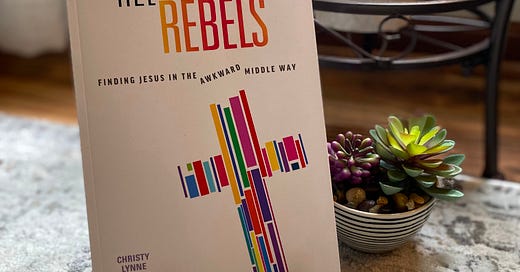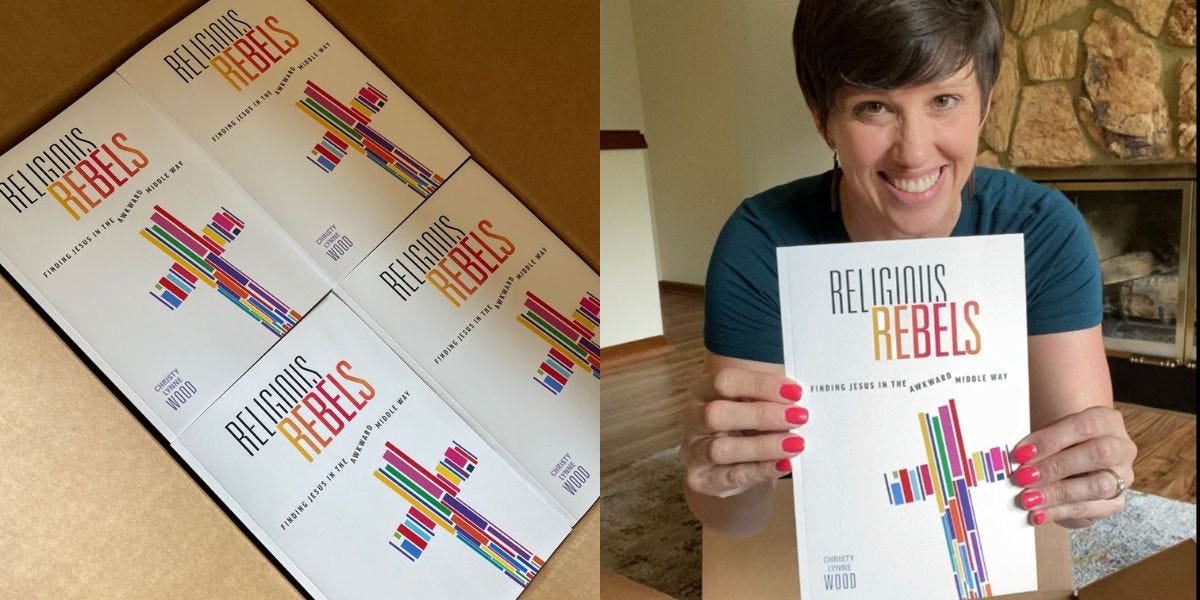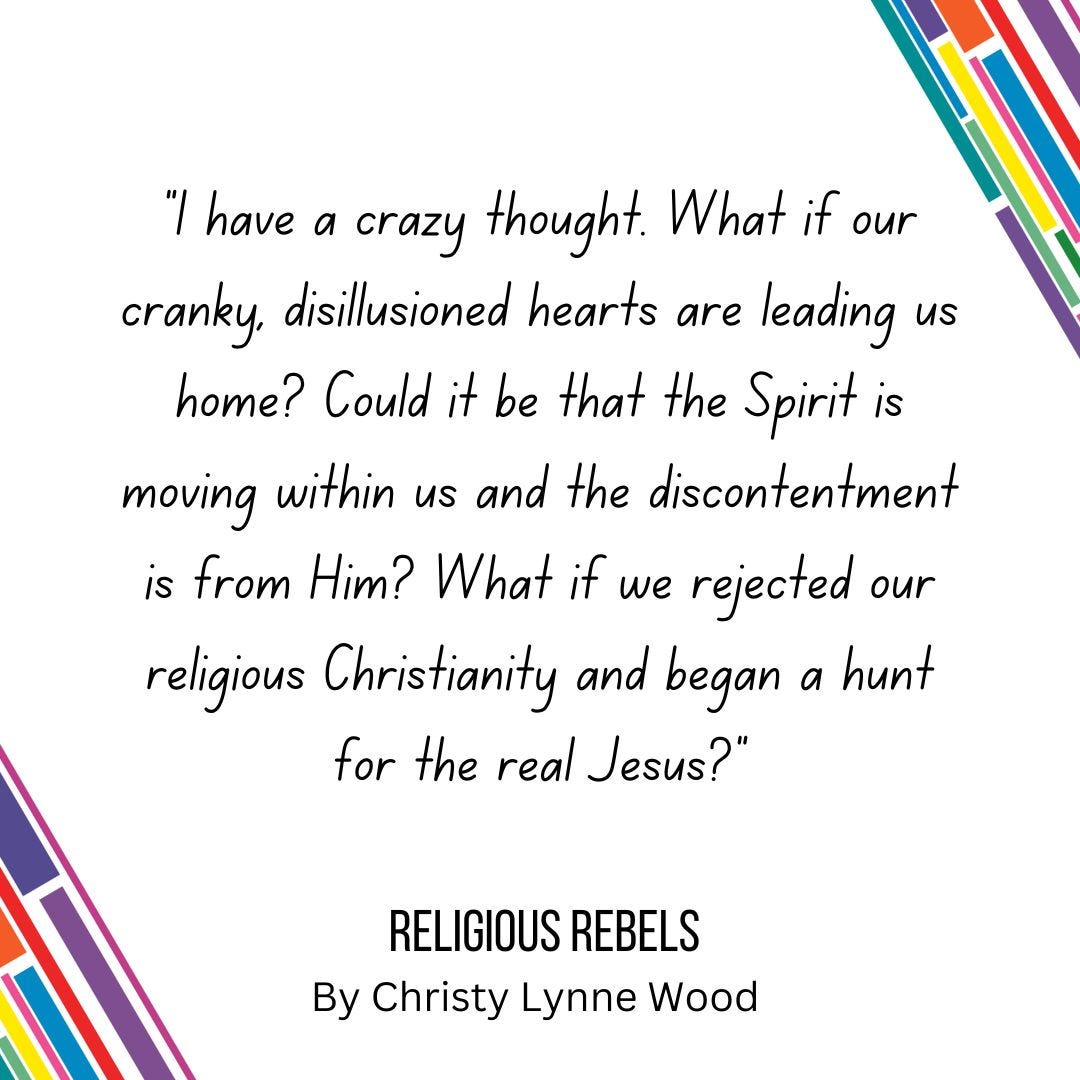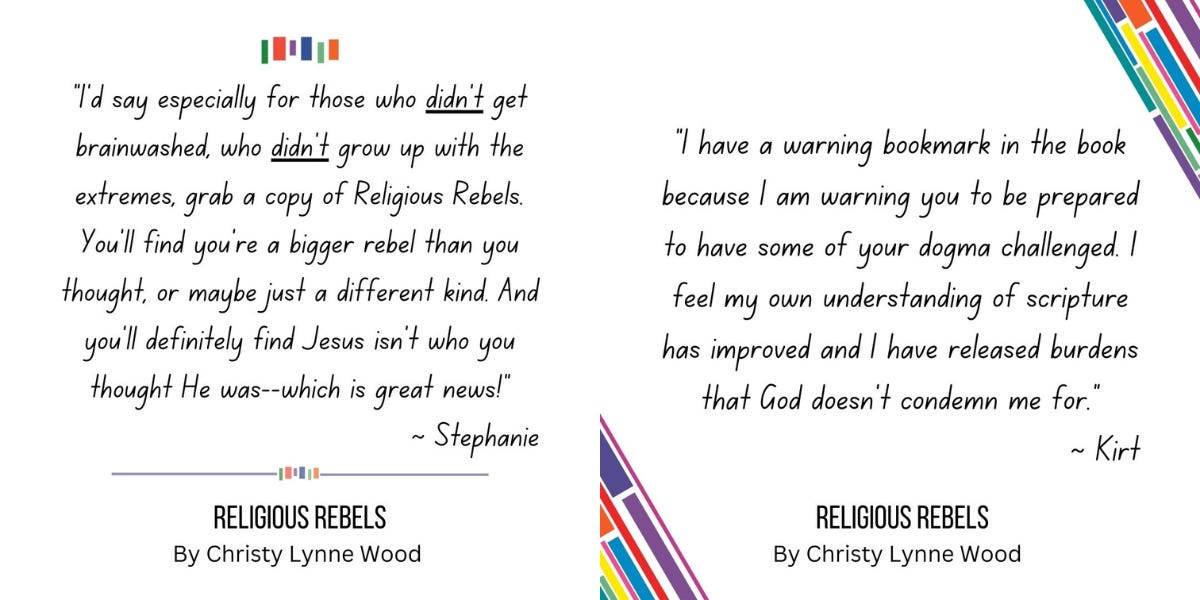Religious Rebels Reloaded
Celebrating almost two years of religious rebellion and the awkward middle way
I think that those of us adulting or growing up in the 80s and 90s craved certainty in a world that felt scary, so we accepted a pile of rules and formulas given to us by religious people who assured us that they would keep us safe.
Now many of us are looking at that pile and wondering, “Where is Jesus?” We are rejecting the pile of rules and formulas with its false comfort and fake safety. But we aren’t rejecting Jesus.
Christy Lynne Wood, on Threads
At this time in 2023, I was one month away from the launch of my first book, Religious Rebels. This book had been a dream for a decade before suddenly becoming a reality. It was all a bit surreal. It still is if I’m honest.
Two years later, I’m still a religious rebel—probably even more of one. I’m continuing to find an ever growing band of Jesus loving misfits. We are still content to muddle around in the awkward middle way as we seek the paradox of grace and truth. I’m still just as certain that the real Jesus is worth the effort of deconstructing and reconstructing our faith.
To celebrate two years of religious rebellion, I’m giving you the first chapter of Religious Rebels in this Substack. It is my story and my heart. I hope you are encouraged.
Chapter 1: Beginnings of Rebellion
I think I’ve been brainwashed. The unexpected thought pierced my sleepy fog. It was after midnight, but all of us girls had been dragged from our sleeping bags for a special lecture. Clumped together on a couple of ratty old couches, we yawned and tried to listen. I was all too aware that my alarm was going off in less than six hours. Prayer meeting started at 6:30 a.m., and if I cared about giving off a spiritual vibe, then I needed to be there. Which meant getting up even earlier to shower, blow-dry, and curl my hair, because for some reason curly hair was also a sign of spirituality.
Mrs. W droned on and on about cliques and friendship, and I felt myself drifting off. Then she said it, the real reason this meeting had been called.
“It just grieved my heart, to look out the window earlier and see you all playing in the snow. I couldn’t tell who the boys were and who the girls were since you were all wearing snow pants.” Her voice dripped with judgmental disappointment.
It was true. At this winter youth retreat, we were all wearing snow pants while we played in the snow. But it was shocking, and apparently deserving of a midnight lecture, because in previous years most of us girls, or at least the godly ones, had worn skirts or culottes over our snow pants to preserve our femininity.
How do I explain culottes? The first ones we wore were homemade and looked like an awkwardly full, calf-length skirt. However, unlike a skirt, if you grabbed the sides and pulled, voilà, there were two sections of fabric, one for each leg. Over the years, our culottes shrank down to a slightly larger version of modern gaucho pants. We wore them when a skirt was a safety hazard, such as swimming, horseback riding, or downhill skiing. Downhill skiing in culottes, even skinnier ones, is a bit like skiing with two flags attached to your legs. I can still feel them streaming behind me flapping wildly in the wind.
The ridiculousness of it all sank in. We had been dragged from our warm beds in the middle of the night to be lectured about modesty because we had failed to put another layer of clothing on top of our already-poofy snow pants.
I rested my head on the shoulder of the girl next to me and stared skeptically at the woman lecturing us. An increasingly familiar feeling of rebellion crept over me. I had always been a good girl—one of the godly ones—but that was changing. And surprisingly enough, it wasn’t rock music, or blue jeans, or college that was turning me into a rebel (like we’d been warned about). It was Jesus.
Do you have a moment like this? When the lights turned on, the questions started, and the rebellion began? Or maybe it was a thousand little moments that ultimately led to one big bang—the scary realization that I don’t believe this anymore. My story might be on the extreme side of things, but I know that the questions I’ve asked and the doubts I’ve faced are common.
The lies I learned in my Christian cult have twisted their way into mainstream churches, books, and sermons. They are familiar lies not tied to one organization or leader but spread across many versions of Christian religion. They are behavior-driven lies that are motivated by fear and used to control. And while many times these lies claim to be backed up with Bible verses and even use the name of God or Jesus, they are not actually truths spoken by Him.
When I first began to deconstruct my faith, it wasn’t even a word people were using. I just knew that it was necessary to dissect the beliefs from my Christian cult, look at them closely, go to Scripture, talk to the Jesus I knew, and determine what was false, twisted, or true. It was something I had to do. Maybe you feel that urgency too.
I’ve gone through four major seasons of faith deconstruction in my life so far, and most of them happened before the phrase became popular. But each time I have rebuilt my beliefs around the actual Word of God and the very real Being who found me when I wasn’t even looking. You will hear more about this later in this book.
Deconstruction is a buzz word these days and unfortunately, like everything else in our society, it has become polarized. People seem quick to form black-and-white opinions about both the process of deconstruction and those who experience it. Some people condemn all deconstruction because they feel it is dangerous and fear that it always leads to apostasy. Other people celebrate it but then assume everyone who deconstructs will automatically come to see the world and faith from their more progressive point of view. Although opinions about the process are often rigid, deconstruction itself is kind of a cloudy term that can mean totally different things to different people. Let’s see if we can make it clearer.
Apart from the faith context, to deconstruct something means to take it apart to its individual components. We can deconstruct buildings, cocktails, clothes, hamburgers, and more. After something is taken apart, the carpenter, mixologist, designer, or chef often analyzes the pieces and then reinterprets them in a new and different way. The process of faith deconstruction shouldn’t be condemned because at its core, it is just taking the Christian religion apart and analyzing the individual components. Let me give you an illustration.
Pretend with me that there was this incredible Lego set. Over the years people added pieces to it—most of them with the best intentions. They were trying to make it look defined, creative, and better designed. But after a while people couldn’t tell what the set originally looked like. It was just a pile of Lego blocks stuck together. This is what has happened with our modern Christianity.
I took the blocks apart and separated the pieces. Then I looked at the instructions—which were kind of crumpled and hard to read. I tried to choose the blocks that belonged to the original set and did my best to follow the directions even though they weren’t always easy to decipher. I put the Lego set back together again and threw the extra blocks in my tote. This is my faith deconstruction and reconstruction story.
Not everyone deconstructs this way, but because we use the same word to describe our journeys, it can be confusing. Some people separate the blocks and then use them to build something completely different. The end results can vary drastically. Other people take the blocks apart and throw them in the trash or leave them in a pile on the floor and walk away for a while or forever.
We all took the pieces apart, so we all call what we did with them deconstruction. But it’s what happened after we took them apart that makes our stories so different. It creates a complicated definition because deconstruction means different things to each of us. If we could just agree that deconstruction means taking something apart down to its individual components, then maybe we could stop condemning or making assumptions.
“Christy, why are you still a Christian?” My friend, who happened to be an atheist, stared at me intently from across the room.
It was a valid question, and one I had been pondering myself. Over ten years had passed since that midnight lecture on the couch, ten years and countless life changes. I was a youth pastor’s wife and mother of two. I wore jeans every day, had a bachelor’s degree from a secular college, and listened to a playlist with drums in every song. People in my current life knew that I had been homeschooled, but even my husband was oblivious to the extent of crazy I’d experienced in our cultic subgroup of Christianity.
Shortly after realizing I might have been brainwashed, I spent a summer working at a Christian camp. Showing up with my ankle-length skirts and waist-length hair, I had a mile-long list of rules and standards. But those normal Christians—people I had been told were worldly—loved Jesus. And they loved and accepted me in a way I’d never felt before. I found freedom in those ten, beautifully wild weeks. Freedom, grace, and life. At the end of the summer, I got a cartilage piercing to remind me of my newfound freedom in Jesus.
My old friends weren’t impressed. Getting chased through Cedar Point—literally running—to avoid their attempt to lecture me about my poor life choices was the tipping point. I shut the door on that part of my life. It was pretty easy since my family was no longer closely associated with our church group or organization. I went to college, met an amazing man who was my total opposite, dated and married him, and left the old me behind.
But now the door to my past was beginning to crack open. I learned that the man we previously respected and followed was being accused of sexual harassment with multiple girls over decades. I discovered a website dedicated to exposing truth about the cultic organization my family was a part of through my teens and early twenties. I found online support groups filled with former students like me. These discoveries confirmed things I had always suspected. The floodgates opened.
My poor husband listened patiently to many rants, frustrations, and memories. I sorted through truths and lies. I connected and reconnected with people who shared an understanding of my crazy past. It was exciting, healing, and heartbreaking.
The number of people who grew up like me but left Christianity completely was overwhelming. I understood in theory. If what we had experienced was the real God, then no wonder they wanted nothing to do with Him. But it made me sad, and it made me question.
Why was I still a Christian? Why hadn’t I run away too? I knew why.
I’d met Jesus. And while I rejected the legalism, ridiculous standards, and performance-driven faith, I couldn’t reject Him. Because I loved Him, and I knew that He loved me. It was worth the fight. It was worth deconstructing and reconstructing my faith to find the real God.
I think many Christians accept a fake version of Jesus without even realizing it, whether they grew up in a cult or not. We speak fluent Christianese, using familiar words and phrases without thought. We follow traditions and believe supposed truth because that is what we were taught. We have black-and-white answers for everything, and the god of our theology is small, understandable, and containable. But if you’re like me, deep within our hearts we find ourselves disillusioned and cranky. What is wrong with us? Why isn’t this Christianity thing working? Why do we feel such shame and condemnation? What made us so cynical? Why can’t we get it together?
I have a crazy thought. What if our cranky, disillusioned hearts are leading us home? Could it be that the Spirit is moving within us and the discontentment is from Him? What if we rejected our religious Christianity and began a hunt for the real Jesus? It’s scary to let go of what you think you know. Sometimes it’s downright terrifying. But if God is real, and if He wants to be found, then we will be okay.
The truth is, our modern Christianity desperately needs this deconstruction movement. And it isn’t anything new. Believers have been rethinking their faith and the beliefs of the corporate church for almost two thousand years. It started with Jesus and continued with the apostle Paul, Martin Luther, Saint Augustine, Dietrich Bonhoeffer, C. S. Lewis, et al. Not everyone got everything right obviously, but they all pushed back against lies of their day in a search for truth.
As broken humans, we are quick to misunderstand and misrepresent God. We all think we are right, but we also all tend to love power, money, and fame. Sin has skewed our perspective. There’s an awful lot of corruption and abuse within the church that has been exposed recently, and while it’s heartbreaking, it isn’t new. The revelation that sinful humans have abused their power and twisted God’s Word doesn’t make Him or it less real or powerful. It just gives us a new opportunity to question, ponder, and explore.
This book is an adventure filled with bits and pieces of my own journey to find truth and reconstruct my beliefs. It is a reminder that Jesus didn’t fit into the religious systems of his day either. And it is an invitation for you to dig into your own questions, fears, and doubts. I’m here to tell you that those questions and doubts are okay. It is good to take apart your faith and beliefs to search for truth. Your skepticism is valid. You are not a bad person because of your doubts.
This book is also the story of how I’ve reconstructed my faith centered around Scripture and the person of Jesus Christ. Not the twisted, out-of-context Bible verses that I grew up with, but Scripture as it was meant to be read: as a whole, according to its genre, and keeping in mind things like culture and author intent. We will talk more about this in a coming chapter. The Jesus I follow today is not the same Jesus I grew up with. I can’t wait to tell you that story. Thanks for being here. I’m excited to have you join me as we rethink the Christianity we grew up with while trying to navigate the Awkward Middle Way of grace and truth.
OUR DOUBTS AND QUESTIONS ARE JUST THE BEGINNING.
I hope you enjoyed this sneak peek! Stay tuned for more over the next month (including a give-a-way) as I continue to celebrate two years of rebellion.
If you’ve read Religious Rebels, it would be wonderful if you could write a short review on Amazon so that other people can also find it. (Thank you if you’ve already done that!) If you haven’t read it yet, it is available on Amazon in Kindle and softcover format. There is also a link at the end of this email where you can order an autographed copy directly from me.
As always, I'd love to hear your thoughts, questions, or comments. You can find me on Threads, Instagram, Facebook, my website, and on my original podcast. I’d love to connect with you on any of these places!
My podcast, Religious Rebels, can be found on YouTube, Apple Podcasts, Spotify, iHeart Radio, and more.
You can order an autographed copy of my book, Religious Rebels: Finding Jesus in the Awkward Middle Way by clicking on the button below. Or you can find it on Amazon.













I grew up United Methodist, so I haven’t had to deconstruct like you have, but I’ve had a lot to learn about the details we all fight over which has definitely changed my faith. I’m (very slowly) learning that Jesus is way more loving and graceful than I've ever really believed.
Sometimes I’m very glad I grew up unchurched living a pretty reckless destructive lifestyle as a young adult. God chased me down in the movie theatre I was managing in 1974 when I was 24 years old through Billy Graham’s film “Time to Run”. I was so lost and desperately searching for something. I trusted in Christ and drank deeply of God’s grace and was saved to a lifelong journey of growing in that same grace these last 51 years. Ten years later after a call to become a pastor in 1974 and a Christian College and Seminary degree I became a Pastor for 40 years retiring from Pastoral ministry in 2023. Having said all this my faith has been renovated over the years as I’ve kept learning and changing some of my beliefs and understanding of God’s love and mercy. I’ve had people come to the churches I’ve pastored trapped in legalism and cultish like beliefs that I’ve helped in deconstructing and renovating their faith in the grace and freedom we have as Grace based followers of Christ. I so appreciate your writings Christy. Thank you.